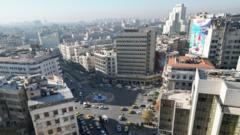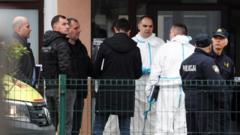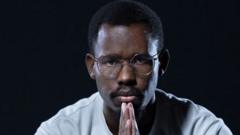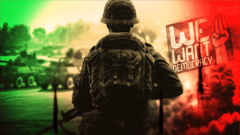Tensions rise in Tbilisi as thousands march against the government's perceived authoritarianism, highlighting deep divisions over Georgia's future direction amid deteriorating ties with the West and civil unrest.
Georgia's Crossroads: Protests Unfold Amidst Allegations of Authoritarianism
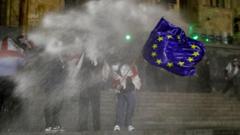
Georgia's Crossroads: Protests Unfold Amidst Allegations of Authoritarianism
As protests escalate in Georgia, demonstrators urge a shift toward Europe, fearing a return to Russian influence.
Georgia's capital, Tbilisi, has become a battleground for demonstrators insisting on a European path rather than succumbing to Russian influences. Nightly protests at Rustaveli Avenue have captivated citizens, draped in EU flags and rallying against their ruling government, Georgian Dream. Despite the party's claims of independence from Kremlin ties, recent governmental actions have ignited accusations of authoritarianism and hostility toward democratic values.
Ongoing protests have turned fierce as riot police deploy water cannons to disperse crowds challenging the legitimacy of the elections held a month ago, which protesters allege were marred by fraud. Spurred by a coalition of four opposition groups and a largely symbolic pro-Western presidency, the call for new elections resonates across the nation, signifying a potential shift away from Russian influence toward closer ties with Western nations.
The ruling Georgian Dream party asserts that grievances are fueled by foreign interference, further escalating tensions. The government faces accusations of brutality against demonstrators, with reports of significant injuries on both sides. Political analysts note that Russia is closely monitoring developments reminiscent of the 2014 Ukrainian protests.
Opponents stress the critical nature of the current struggle, framing it as a fight for Georgia’s national identity, asserting a stark choice between continued European integration or a return to Russian influence. However, governmental support remains, as many in power argue that allegations of external funding for protests come with no substantiation.
As divisions deepen, and calls for democratic accountability amplify, both sides remain entrenched, with no signs of resolution. This impasse continues to attract international attention, raising concerns about Georgia's strategic partnership and its geopolitical future in a contentious regional landscape.
Ongoing protests have turned fierce as riot police deploy water cannons to disperse crowds challenging the legitimacy of the elections held a month ago, which protesters allege were marred by fraud. Spurred by a coalition of four opposition groups and a largely symbolic pro-Western presidency, the call for new elections resonates across the nation, signifying a potential shift away from Russian influence toward closer ties with Western nations.
The ruling Georgian Dream party asserts that grievances are fueled by foreign interference, further escalating tensions. The government faces accusations of brutality against demonstrators, with reports of significant injuries on both sides. Political analysts note that Russia is closely monitoring developments reminiscent of the 2014 Ukrainian protests.
Opponents stress the critical nature of the current struggle, framing it as a fight for Georgia’s national identity, asserting a stark choice between continued European integration or a return to Russian influence. However, governmental support remains, as many in power argue that allegations of external funding for protests come with no substantiation.
As divisions deepen, and calls for democratic accountability amplify, both sides remain entrenched, with no signs of resolution. This impasse continues to attract international attention, raising concerns about Georgia's strategic partnership and its geopolitical future in a contentious regional landscape.









